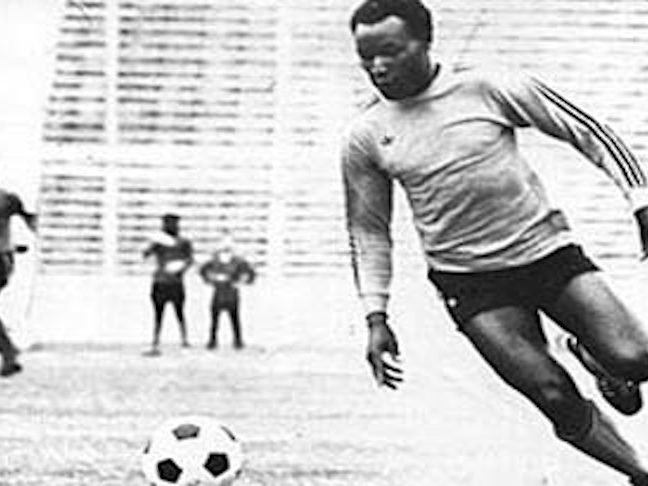
Africa’s Undisputed Goal King (Part Sixteen) The End of an Era
November 8, 2020
Africa’s Undisputed Goal King (Part Eighteen) The Decline and Fall of Africa’s Finest
December 27, 2020By Satish Sekar © Satish Sekar (May 13th 2020)
The Rot
Ghana’s Black Stars had lost the 1970 Africa Cup of Nations (AFCON) tournament in Khartoum in controversial circumstances. Jaafar al Nimeiri had seized power in a coup in May 1969. Less than a year later Sudan hosted the seventh AFCON – they had hosted the inaugural AFCON in 1957, finishing third of three participants, losing badly to the hosts the United Arab Republic (Egypt) two years later and again to Ghana in 1963.
Nimeiry knew that only victory would do at Sudan’s second AFCON. Omar El-Rasoul (Hasabu El-Sagheer) scored the winner after 12 minutes in final mired by controversial performance of the then Ethiopian referee, Gebreyesus Tesfaye who died last year.
The Black Stars refused to collect their runners-up medals and were ordered to leave Sudan rapidly. Nimeiri had delivered success on the pitch.
Within a month Nimeiri was confident enough to cash in his AFCON-win bonus. Starved of international success and seen as having stood up for Sudan’s prestige by ordering Ghana out Nimeiri was confident to commit an atrocity with impunity – the aerial bombardment of Aba Island, base of the Umma Party – opponents. Many were killed.
AFCON and Power
Nimeiri came to power knowing that football could help. It did, but power mattered most. Would he have survived the atrocity – attempted it even – just six weeks later if Sudan had not broken their AFCON duck? But 1970 was the summit of Sudan’s achievement in AFCON – football even.
It was never a priority again. Nimeiri survived several coup attempts, moved to the right, impose Sharia law in 1983 and used execution as a political weapon. The arrest and execution of independence activist and Islamic thinker, Mahmood Taha is a case in point. Taha never hid his beliefs that the Medina verses of the Quran were suitable for their times (the 7th Century) but that the Mecca Verses (a second phase) were more suitable for the modern 20th Century World.
Nimeri had him executed on January 1985 – he was 76. Taha went to his death head held high, jeered at for apostasy, but his death came at a price.
Years later Nimeiri regretted the execution, blaming the Justice Minister and hardline Muslim, Hassan Al-Turabi for it. Nimeiri jailed al-Turabi again – he had done so after the 1969 coup – but it was too late.
Spiralling prices and other discontent prompted a military coup led by Abdul Rahman Swar al-Tharab, which ousted Nimeiri on April 1985. It was too late for a football miracle. Al-Tharab handed power to civilian rule in May 1986 to Ahmad al-Mirghani. He was overthrown on June 30th 1989 in a military coup by Omar al-Bashir – after almost 30 years in power al-Bashir was toppled as the army intervened following public protests.
In December 1989, within six months of al-Bashir seizing power, Omdurman’s Al-Merrikh became the first and, so far only Sudanese team to win a CAF club tournament, the Cup Winners’ Cup by beating Nigeria’s Bendel United 1-0.
The Doldrums
Sudanese football did next to nothing after 1970. It had been a power in African football. In the first 13 years of AFCON it had reached the final three times – losing twice and winning once.
Afterwards, Sudan did little of note, qualifying for AFCONs 1972 and 1976 but were eliminated at the first hurdle. Sudan then failed to qualify for three decades – 32 years to be precise. , they exited at the first stage. In 2012 Sudan reached the quarter-finals. They failed to qualify for the next four AFCONs. They won the Council for East and Central African Football Associations (CECAFA) Cup – Africa’s oldest tournament – for the first time in 1980 during Nimeiri’s rule.
They qualified for the 1972 Olympic Games for the first and only time but exited in the first round – Ghana was eliminated at that stage too with a worse performance.
“The down-turn comes,” the legendary Ghanaian coach Charles Kumi Gyamfi told me exclusively over a decade ago. “It doesn’t matter.”
But it did. Ghana had a blueprint and threw it away. Congo-Kinshasa’s dictator, Joseph Mobutu, and Sudan’s Nimeiri were different. They saw their opportunity to benefit from football’s popularity and took it.
And club football was little different. Al-Merrikh won the CECAFA Clubs Cup three times – the first time in 1986 by beating Young Africans 4-2 on penalties after drawing 2-2. They wo it again in 1994 and 2014 after losing finals in 1987 and 1988.
They are, however, the only Sudanese team to have won a CAF clubs trophy and the CECAFA Clubs Cup as well.
Meanwhile, Ghana entered its wilderness years – from AFCON finalists to failing to qualify, Olympic Games humiliation and more, yet Ghana was represented in the APotY vote despite the significant omissions of Godfrey Chitalu, François M’Pelé and Jean-Michel M’Bono.



